Tech
Teaching Tech in Bangla: Mojahidul Islam’s Mission to Empower a Digital Generation
Published
2 years agoon

For most authors, publishing a book is a dream tucked between the pages of hope. For a lucky few, that dream blossoms into a booming business. In the literary world where imagination meets economics, royalties act as the lifeline—connecting the soul of art to the reality of income. One remarkable example of this fusion is Md. Mojahidul Islam, widely recognized as the bestselling author of Bangla-language ICT books.
In the early 2000s, the digital world looked nothing like today. Internet access in Bangladesh was scarce, and computers were considered elite possessions. Public understanding of technology was limited—Facebook hadn’t gone global, YouTube was a concept unborn, and e-learning was still a whisper on the wind. Amid this tech twilight, Mojahidul Islam emerged in 2003 as one of the pioneering authors writing about computers in Bangla. At a time when technical resources in the native language were nearly non-existent, his work became a light for countless learners navigating a dark, unfamiliar terrain.
Known fondly as “Dheow” by his readers, Mojahidul Islam took the dense, jargon-heavy language of information technology and translated it into something students and young professionals could actually understand. His mission was simple but powerful: make ICT education accessible in Bangla. The impact was huge, earning him national recognition and a series of awards for his contributions to tech education.
Back then, the ICT sector in Bangladesh was still crawling. Most computer training materials were in English, and even those were hard to come by. Internet costs were sky-high, and trained instructors were few and far between. Mojahidul, a computer science graduate, saw this gaping need and decided to write Bangla tech books to fill the void. His books quickly gained popularity not just in Bangladesh but also across West Bengal, India. Within the first six months of launching his initial titles, he was receiving positive reviews—and by the end of the first year, he had sold over 30,000 copies, earning an impressive Tk 12,00,000 in royalties, more than his own annual salary at the time.
His books, published by major local publishers such as Systech and Gyankosh Prokashoni, often came bundled with CDs and earned him royalty rates as high as 30%—a rare feat in an industry where authors usually receive between 8% and 15%. This generous rate helped him become one of the most financially successful ICT writers in the Bangla language, with annual earnings exceeding Tk 3,00,000.
But for Mojahidul, the mission extended far beyond profit. He’s a firm believer in the power of ICT training to reshape futures. He advocates for government-supported programs to teach practical skills such as graphic design, SEO, web development, hardware repair, and e-commerce management. With nearly 70% of Bangladesh’s population—around 110 million people—under the age of 35, he emphasizes the urgency of offering educational resources in Bangla to ensure inclusive growth.
Despite having over 350 million Bangla speakers worldwide, Bangla still lacks significant representation in tech and digital content. Mojahidul calls for a collaborative push involving government agencies, linguists, tech experts, and researchers to elevate the status of the Bangla language in the digital domain.
His bestselling titles include Practical Networking Handbook, Swapner Career, 7 Days to Web Design: Dreamweaver MX, and Mastering E-Commerce. These books have not only shaped personal careers but have also been integrated into public training initiatives. For example, in 2007, the Department of Youth Development purchased his books to train unemployed youth in computer basics and troubleshooting. In 2017, the Bangladesh Bureau of Educational Information and Statistics procured his works for use in school computer labs, helping build the ICT capacity of educators across the country.
Reflecting on his journey, Mojahidul shares that it all began with a realization: there was a massive gap in ICT awareness. So, he started writing. Over time, his focus shifted from translating existing content to crafting original works designed specifically for the young and unemployed—those who needed both knowledge and direction. He strongly believes that tech education can transform idle youth into active problem-solvers and contributors to national progress.
Beyond being a bestselling author, Mojahidul Islam is also known for his journalism and advocacy for digital education. He highlights the global demand for freelancers and insists that with proper training, even moderately educated individuals—homemakers, students, rural youth—can thrive as freelancers or entrepreneurs. This, he argues, can revolutionize economic independence in Bangladesh.
However, he also points out the elephant in the room: employment. Despite a surge in university graduates, job opportunities haven’t kept pace. Many young people, especially from lower and middle-income families, are leaving cities due to financial stress or looking abroad for work. Bangladesh’s youth bulge—46% of the population—is a ticking clock. If the government doesn’t invest in scalable, skill-based education soon, the demographic advantage could slip away.
He laments that while education has expanded, it often lacks depth. Many sectors still rely on foreign expertise because our training models emphasize rote learning instead of practical, job-ready skills. To counter this, he urges a focus on innovation in education, especially ICT-based training in Bangla.
Mojahidul’s success didn’t happen overnight. “I treat writing like a business,” he says. “I invest in editing, design, and marketing. And above all, I show up consistently.” Industry statistics reveal that fewer than 10% of authors in Bangladesh earn more than Tk 3,00,000 per year—usually by writing multiple books and taking charge of their own promotion. Mojahidul is living proof that with persistence and strategy, writing can become a full-time, financially sustainable profession.
To him, success in writing isn’t just about putting words on paper. It’s about creating a brand, cultivating readers, and understanding the economics of publishing. His story is a testament to how storytelling—when blended with smart planning—can lead to both impact and income. In a world where dreams are often dismissed, Mojahidul Islam reminds us that books can indeed turn into businesses, and passion can absolutely pay the bills.
You may like
-
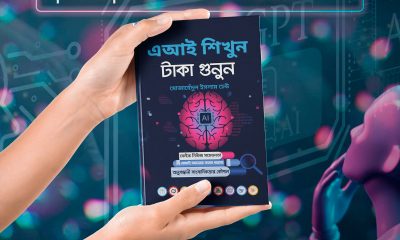

From Confusion to Clarity: Dheow’s Book Helps Users Master ChatGPT Conversations
-


Empowering Youth and Transforming Lives: The Impact of ICT Pioneers in Bangladesh’s Digital Future
-


Wired for Truth: The Rise of Investigative Tech Journalism in Bangladesh
-
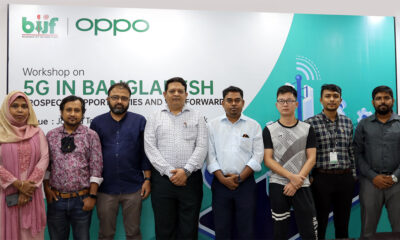

OPPO Bangladesh and BIJF Host Workshop on 5G Technology
-
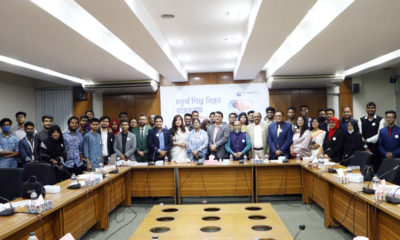

Round Table Conference on ‘Needs of ICT Olympiad Bangladesh in Reality of 4th Industrial Revolution’ was held
Tech
From Confusion to Clarity: Dheow’s Book Helps Users Master ChatGPT Conversations
Published
2 months agoon
November 10, 2025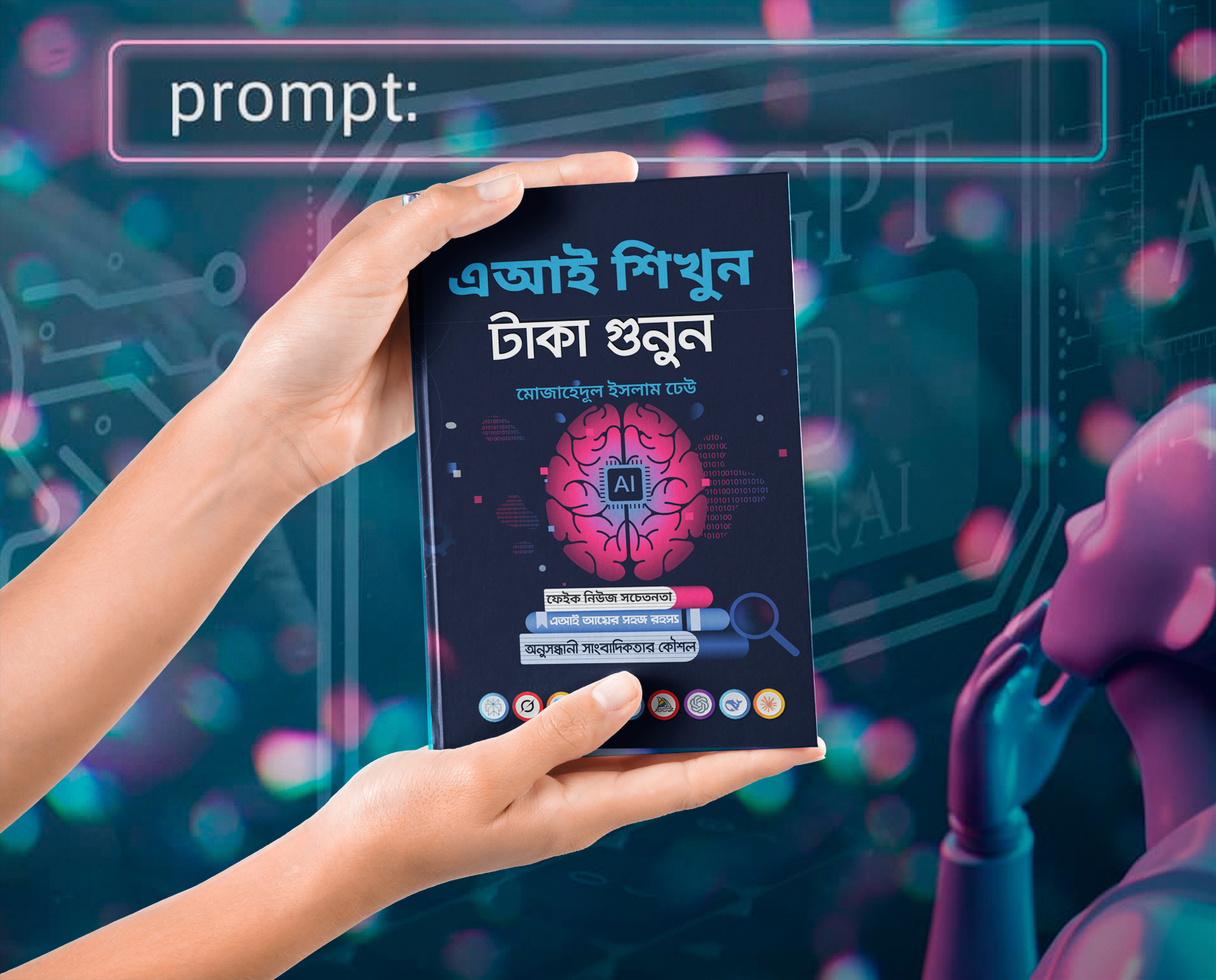
The much-anticipated book ‘AI Shikhun Taka Gunun’ (Learn AI, Count Money) by ICT writer and journalist Mojahidul Islam Dheow has officially hit the shelves. According to Systech Publications, the book received an overwhelming response even before its release, with more than 1,600 pre-orders placed within the very first week through platforms like Rokomari.com, Prothoma, and other online stores. It is now available at bookstores across Bangladesh, including Systech’s outlet in Banglabazar, Dhaka, at a printed price of Tk 400.
In today’s fast-changing digital world, we stand at a crossroads where a single keystroke can open the door to new income opportunities. Artificial Intelligence (AI) has become humanity’s newest coworker—reshaping how we live, learn, and earn. Mojahidul’s latest book builds a bridge from learning to earning, connecting investigative journalism with public awareness and guiding readers toward practical uses of AI for creativity, innovation, and income generation.
The book is thoughtfully divided into three major parts. The first part serves as an income guide for young learners, showing them how to use AI prompts and tools to find freelance work, generate creative ideas, and turn them into profitable ventures. The second part functions as an investigative toolkit for journalists, offering hands-on advice on data mining, source verification, and cybersecurity using AI applications. The third part caters to general readers, simplifying the complex world of AI and explaining its opportunities and risks in easy, everyday language—from detecting deepfakes and misinformation to understanding how AI is transforming modern life.
Within its chapters, the author introduces over 150 AI tools across more than 30 categories, helping readers explore the most effective AI resources for any purpose—whether for business, work, or personal development. The book highlights tools for AI assistance, video and image generation, automation, meetings, and research. It also discusses AI-powered writing, design, and app-building platforms, alongside innovative AI search engines. Readers will find valuable insights into AI tools for knowledge management, email automation, scheduling, presentations, and even résumé creation. Mojahidul further explores creative fields such as AI-generated voice and music, as well as marketing innovations that promise to revolutionize both productivity and imagination in the digital age.
Md. Mojahidul Islam Dheow, a computer science graduate, has been an active voice in ICT writing since 2003 and has authored over a dozen books. His title Web Database Application: MySQL-PHP was the first Bangla-language book on web database and application development, earning him the Bestseller Award in 2021. His writing style is lively, accessible, and deeply engaging—sometimes technically detailed, sometimes playfully conversational. Reading his work feels like chatting with a tech-savvy friend who’s eager to share smart digital tricks over a cup of coffee.
There are plenty of reasons to read AI Shikhun, Taka Gunun. Whether you’re a beginner looking to start freelancing, a journalist interested in mastering AI-driven investigative tools, or a curious reader eager to understand how AI is reshaping everyday life, this book speaks to all audiences with equal clarity and enthusiasm. Ultimately, Learn AI, Count Money is more than just a book—it’s a complete roadmap for thriving in the era of artificial intelligence.
Speaking about his new release, Mojahidul Islam Dheow shared his vision for the book:“This book reveals countless ways to earn through AI. You can use AI content tools to offer writing services, manage brands and social media accounts, or provide AI-powered SEO solutions. You can even build and sell your own custom GPTs! If you’re creative, AI-generated art and images can become great sources of online income. Similarly, AI-driven affiliate marketing, ad management, and optimization are becoming increasingly popular.
Many people struggle to find the right prompts that bring out useful and engaging responses from ChatGPT. It can be frustrating to spend time crafting questions only to get results that miss the mark. That’s where this guide comes in. In this book, I’ve compiled a collection of over 500 effective prompts designed to spark creative and insightful responses. For example, if you’re writing about travel, instead of asking, ‘Tell me about traveling,’ try, ‘Describe a perfect day in Paris, from breakfast to dinner.’ The same logic applies to IT support—rather than asking, ‘How do I fix my computer?’ ask, ‘How can I speed up my Wi-Fi on Windows 11?’ The more specific your prompt, the clearer and more helpful the answer will be.
Translation and localization services powered by AI also open up easy income opportunities. You can create and sell digital products, offer AI tutoring, or launch online courses. Building AI-powered websites, managing email campaigns, developing chatbots or mobile apps—even automating lead generation—AI offers endless possibilities. Finally, AI is now an incredible assistant in data collection, management, and analysis. You can even generate AI-based video content and monetize it on video platforms.”
Through AI Shikhun, Taka Gunun, Mojahidul Islam Dheow once again proves his mastery in blending technology with practical wisdom. His latest work doesn’t just teach readers about AI—it empowers them to turn knowledge into action, and curiosity into income, in the exciting new world of artificial intelligence.
Tech
Pre-Orders Open for Mojahidul Islam’s Latest Computer Book ‘AI Shikhun, Taka Gunun’
Published
4 months agoon
September 12, 2025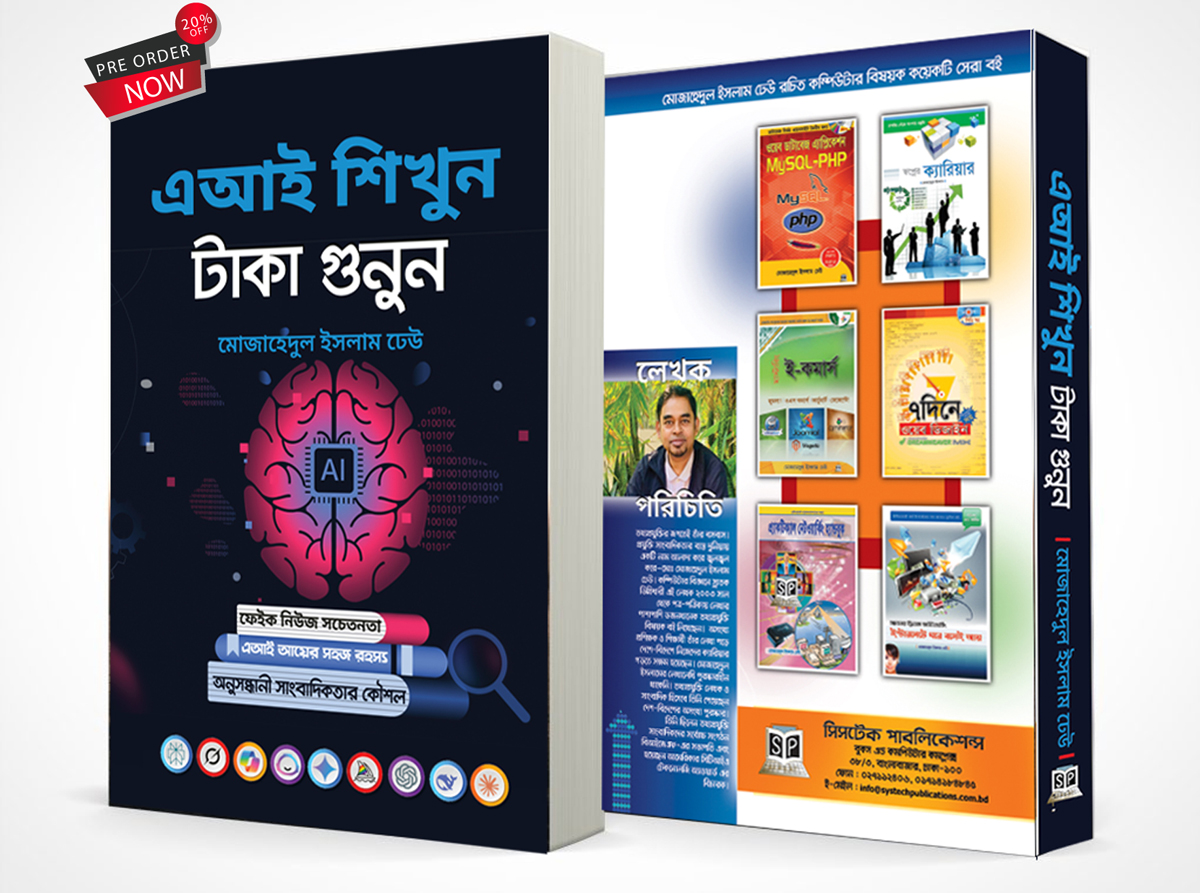
Technology writer and journalist Mojahidul Islam Dheow is set to release his new book, “AI Sikhun, Taka Gunun.”
Online pre-orders have already started, and the book is being published by Systech Publications.
In today’s digital age, we stand at a turning point—where simple keystrokes can turn into dollars, and Artificial Intelligence (AI) is becoming humanity’s newest coworker.
This book acts as a bridge, connecting learning with earning and blending investigative journalism with awareness-raising for general readers. The book is structured into three parts.
The first section is designed as an earning guide for young people. It explains how AI content prompts can create opportunities in the freelancing market and how small ideas can grow into significant income streams.
The second section serves as a hands-on investigative handbook for journalists, offering practical tips on using AI tools for data mining, verifying sources, and ensuring cybersecurity.
The third section is aimed at general readers. It presents the opportunities and risks of AI in simple language while also teaching methods for spotting deepfakes and identifying fake news.
Mojahidul Islam Dheow, a Computer Science graduate, has been writing and publishing technology-related books since 2003, with more than a dozen titles to his name.
His book “Web Database Application: MySQL–PHP” was the first Bangla-language book on website database and application development, earning him the Best Author Award in 2021. Dheow’s writing style is lively and accessible—sometimes deeply technical, sometimes witty and lighthearted. His words make readers feel as though they are casually learning new hacks while chatting with a friend.
This book is equally valuable for three key audiences: those who want to start freelancing but don’t know how to begin, journalists eager to learn the magic of AI-powered data tools, and everyday readers curious about how AI is reshaping our daily lives.
All in all, “AI Sikhun, Taka Gunun” is not just another book—it is a complete roadmap for surviving and thriving in the age of AI.
According to the author, the book will help readers discover numerous exciting ways to earn with AI. These include offering writing services with AI content tools, managing brands and social media accounts, providing AI-powered SEO services, creating and selling custom GPTs, producing AI-generated art and images, affiliate marketing, optimizing paid advertising, offering translation and localization services, developing and selling AI-powered digital products, teaching and hosting online courses, building websites and running email marketing campaigns, creating AI chatbots for businesses, developing mobile apps, automating lead generation, managing and analyzing data, and even producing AI-powered YouTube content.
The printed price is 400 Taka. If pre-ordered, the book can be purchased at a 20% discount for 320 Taka at https://www.rokomari.com/book/504542/ai-shikhun-taka-gunun.
Tech
A10 Networks Expands its Cybersecurity Portfolio with Acquisition of ThreatX Protect
Published
10 months agoon
March 13, 2025
ThreatX Protect Addresses Critical Need to Protect Against Evolving Application and API Security Threats
To continue to help customers address the rapidly evolving cyber threat landscape, A10 Networks has acquired the assets and key personnel of ThreatX Protect expanding its cybersecurity portfolio with web application and API protection (WAAP). The acquisition is expected to be modestly accretive to A10’s earnings per share in 2025 and has closed.
Attacks against web applications and application programming interfaces (APIs) are on the rise and are a significant threat to enterprises. ThreatX Protect provides a unique WAAP solution using behavioral and risk profiling to help protect enterprises from evolving threats, including threats to AI applications, which can complement an AI firewall. Delivered as a software-as-a service solution, ThreatX Protect includes API protection, bot management and next-generation web application firewall.
“Expanding the A10 Defend security portfolio with ThreatX Protect gives our customers an additional tool in their strategy to protect against new and evolving threats,” said Dhrupad Trivedi, president and CEO, A10 Networks. “Our strategic focus is on helping enterprises secure their applications and networks from the growing number of threats today, as well as protecting the emerging AI use cases of the future. Adding WAAP to our solution set gives customers additional capabilities to help establish a strong security posture.”
“We are thrilled that A10 Networks has acquired certain assets of ThreatX, including the brand and the TX Protect WAAP solution to expand A10’s security portfolio,” said Gene Fay, CEO of ThreatX. “A10 has been a fantastic partner throughout this process, and we are confident that our customers and employees will thrive under their leadership.”
As a result of this transition, the remaining assets of ThreatX will be launched as Run Security with TX Prevent, the cutting-edge eBPF-based solution re-launched as RS Prevent.
ThreatX Protect supports A10’s strategy of helping customers deploy A10 security solutions in a hybrid approach to protect apps and APIs running anywhere – public cloud, private cloud, co- location facilities or on-premises. The A10 Defend portfolio of solutions provides DDoS protection, DDoS threat intelligence and web application, and now adds a full-featured WAAP solution all integrated into a single platform with end-to-end delivery and stronger security for mission-critical applications.
Specific terms of the transaction were not disclosed. The acquisition is consistent with A10’s stated strategy of expanding the Company’s security portfolio to grow in the enterprise market. The acquisition does not represent a material change to the Company’s 2025 financial outlook or long-term business model.

From Confusion to Clarity: Dheow’s Book Helps Users Master ChatGPT Conversations

Pre-Orders Open for Mojahidul Islam’s Latest Computer Book ‘AI Shikhun, Taka Gunun’

Bangladesh’s Press at a Crossroads: Between Promises of Reform and the Shadows of Repression










